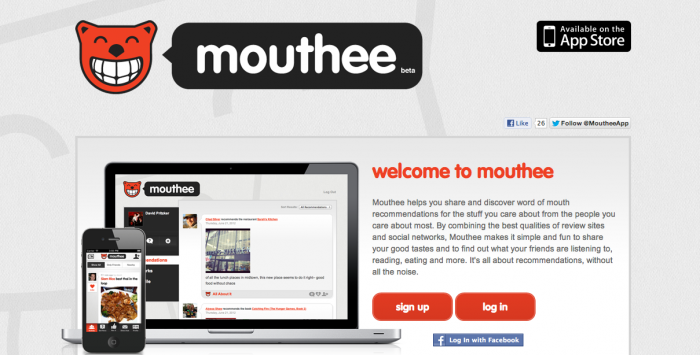It’s been about seven months since social-recommendation app Mouthee launched allowing users to ‘Rec’ favorite restaurants, movies, music, books and hotels or ‘Get Recs’ from each other. The Doejo-designed and developed Mouthee mobile app ties into the APIs of Amazon, iTunes, Yelp, Fandango, Last.fm and OpenTable to make discovering new passions simple, streamlined, and right at your fingertips. And we are proud to announce Mouthee’s inclusion in tonight’s Technori Pitch.
Co-founder David Pritzker will take the stage to demo the iOS app and introduce the web application component, also launching officially today. We spoke with David ahead of the pitch about Mouthee post-launch, what challenges he’s faced as a startup entrepreneur and how he’s benefiting from his residency at new startup hub 1871.
What has the feedback been since launching Mouthee?
The feedback has been overwhelmingly positive from users. And other people I’ve shown the app to they really love the design. From what we can tell from the analytics built in, people are spending a lot of time just on the feed. I think users like to just scroll through and see what other people are up to. It wasn’t something we expected, we just thought it’d be a fun little feature; we thought people would use the “Get Rec’d” and search functions.
We’re at around the 7,000-range of recommendations so far. This is something we did through zero marketing expense, strictly through word of mouth. The next phase for us is to start trying to get the word out beyond our own circle, do some marketing efforts, some PR, and use Technori as a catalyst for that also with the launch of the web app.
Users have also suggested we add categories, primarily TV shows and then products or shopping. TV shows may be simpler to do and a natural next step for us to explore, but shopping (like stores and boutiques) gets a lot more complicated. It’s tougher because we like to make everything on the recommendation side as simple as possible.
You have to take suggestions and feedback and figure out what makes sense; you can’t build a product that’s completely customized to every single user, that’s impossible.
How are you going to begin to market Mouthee and to whom?
We’re looking into marketing initially with some students at the University of Michigan and to start sponsoring some functions for fraternities and other events on their campus. We really want to tap the college market. With something like this where it’s all about sharing and recommendations with your friends, it feels important to go after groups of people at a time. College campuses are ideal where you can reach pre-populated groups like the fraternity system. So we’re going to do stuff like sponsoring beer pong tournaments with Mouthee cups and ping pong balls and other kinds of incentive programs. [Co-founder] Chad [Silver] went to the University of Michigan and we know a student there that we thought would be a good fit for leading this effort on the campus.
Are you looking into Chicago-area colleges?
We wanted to try it out at a large school [like the University of Michigan], we’re kind of doing tests before we spend all of our funds on this marketing effort.
What other avenues of outreach geared towards specific recommendations?
We definitely want to reach out to people that have a connection to one of the categories, be it tastemakers or influencers in that specific category or student organization like a book club or film club. And it’s definitely a different approach from one school to the next. At the University of Michigan, there’s a big college football scene and parties on Saturdays before games where we can reach people. We may say to [users], ‘Hey, go see this movie on us’ and have them throw up some recommendations. Those are kind of the initial things we’re going to roll out with next on a bootstrapped budget.
What challenges have you faced in the past seven months, has the user experience changed at all?
User acquisition was the biggest challenge but I don’t know if it was necessarily unexpected. One thing has been in differentiating ourselves from the competition out there; we wanted to stay true to our initial vision of being word-of-mouth recommendations from people that you know.
At this point we haven’t really done any real pivoting. We’ve talking about possibly aggregating reviews from other sites [into Mouthee] too, for example we have some user reviews of restaurants but when you’re looking at a recommendation you’re tied into a Yelp review under that. But we’d keep social reviews from your friends at the top because that’s what you use Mouthee for, though to have those other reviews initially adds the value proposition for the user. We’re trying to change user behavior in the way people try to find recommendations.
We’re trying to take the way we feel people talk about word-of-mouth recommendations in the real world and harness that and capture it online, but that’s not the way they’ve been doing it online traditionally. Trying to change user behavior is certainly not an easy task.
What opportunities will the online Mouthee app bring and how is Mouthee evolving?
The primary benefits aren’t that it’s a difference but that it opens it up to a whole new universe of users not [just] iOS users. It’s also just for those that are sitting in front of their computer that might not be as quick to take out their phone but they will add it to the list of sites that they check killing time, we think we’ll increase some users there. We’ve also taken advantage of the extra space, we have breakdowns [statistics] of where your recommendations are. So we can see that [you, for example] are big into books, your book recommendations are the majority of your recommendations. You can also see a breakdown of the majority of user’s recommendations. You can see that it’s Restaurants, music and then movies, then books and hotels.
It’ll have more of an emphasis on sharing, where you can share your recommendations more easily on Facebook and Twitter.
Mouthee’s also been a resident of 1871 for a few months, what benefits have you seen in that incubation space?
1871 has been such an incredible experience for me especially as someone who is coming in as a first-time entrepreneur to be able to observe what all these other companies are doing and talking to these people about strategies that are working for them. All the programming that is offered at 1871, they do such an incredible job at putting it together.
I kind of talk about the program there as ‘the school for startups.’ Everything you could possibly want to learn, there’s going to be a course on it or another resident company you can talk to, networking events, or office hours, which are held daily and you can meet with everyone from venture capitalists to attorneys to people in PR and marketing, product and development, you name it. It’s such a supportive and encouraging environment too, everyone seems to want to help everyone else out. They want everyone to succeed. The energy and attitude there towards helping these companies grow in anyway they can has been really incredible. That’s on top of the fact that you can go into a place and set up shop is huge, access to WiFi, printing. The tough part of 1871 is deciding what not to do.
Why do you think so many people like to share their photos and recommendations on platforms like Instagram and Mouthee?
There is just a certain human nature that we want to express of ourselves. We want to tell people about what we’re doing and help others when they’re trying to decide where to eat or what movie we went to go see.
People also take a certain pride as being a trendsetter and someone who is the first to recommend something. There are also times when when a place or a song or a movie triggers memories for people. An old movie might come on and someone will recommend that movie and make some comment about the time they first saw that movie. One way or another, they are triggering a certain emotional response and they feel a desire to want to express that and share with other people.
Starting out on an adventure like this is certainly a rollercoaster, there are great days and then there are days that are more challenging than others. But I’m really excited to see where Mouthee is right now and more excited to see where it is going forward.
What would you tell tech startup entrepreneurs just starting out?
Make sure to dedicate time and planning on your go-to-market strategy. It’s so easy for founders to get caught up on perfecting their product and moving towards launch, but it’s equally important to make sure you have a strong plan for launching once you’re ready.

